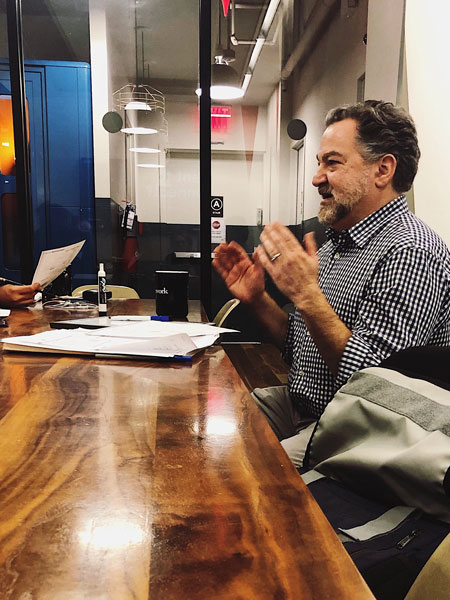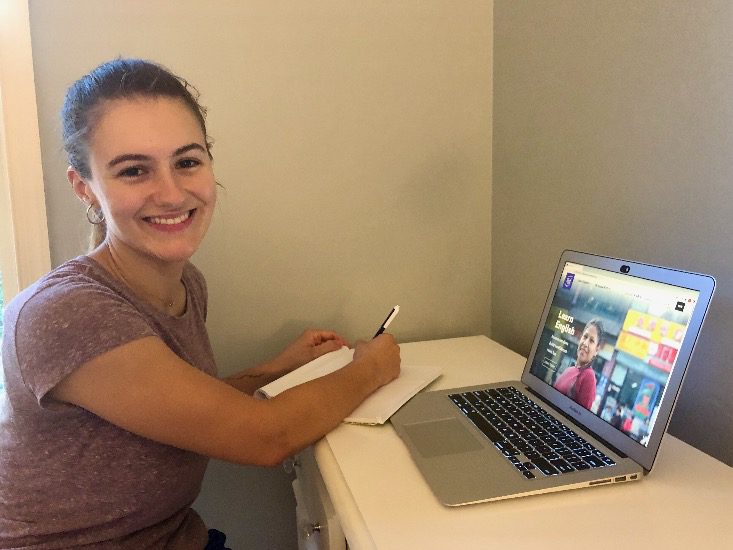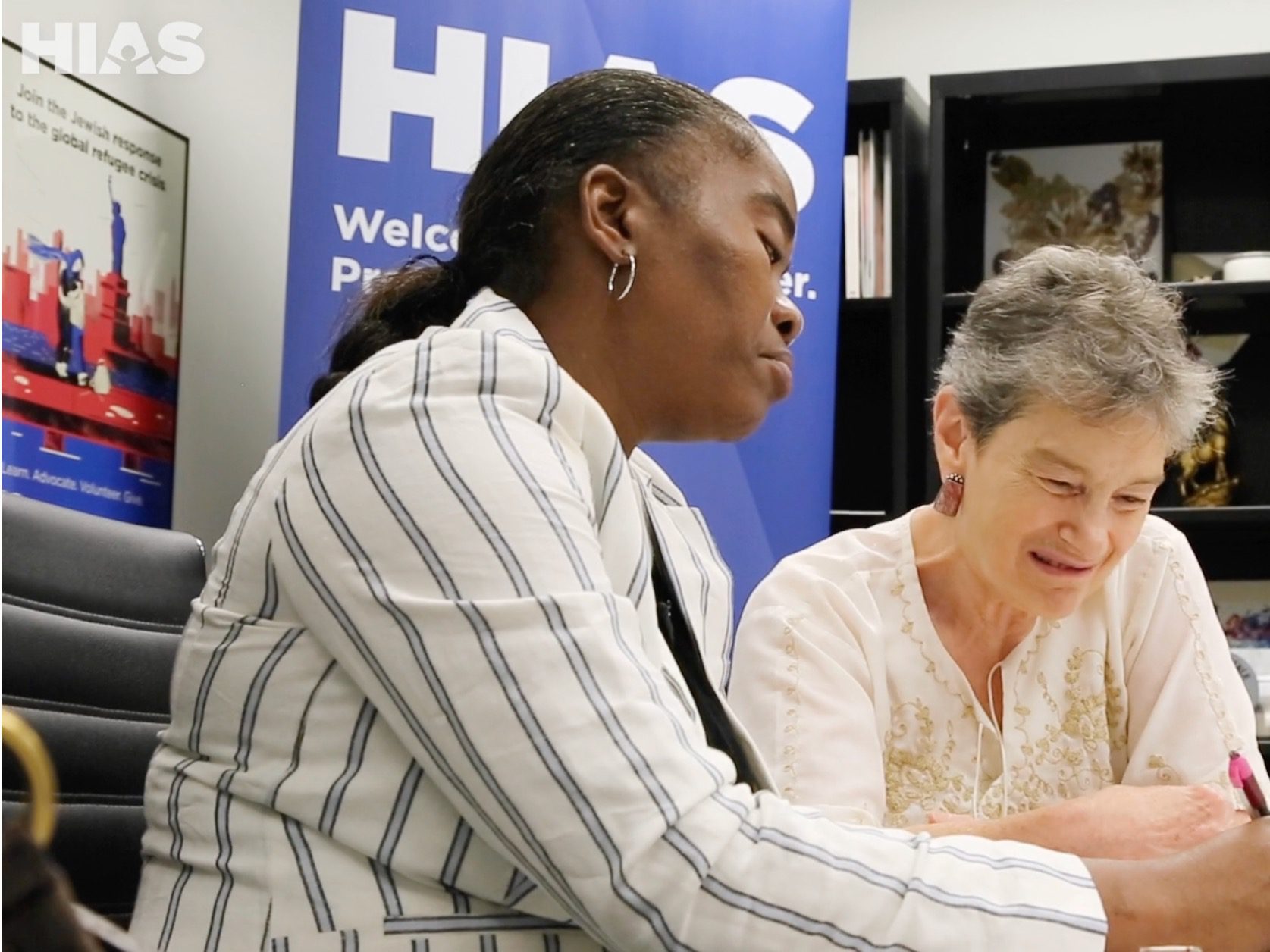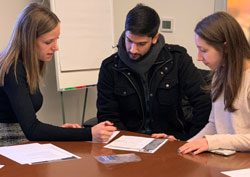Volunteer Spotlight: Teaching English and So Much More
By SaraJane Renfroe, HIAS Volunteer Services Program Intern
Mar 22, 2019

HIAS volunteer Neal Smith in the middle of a teaching moment. March 2019.
(SaraJane Renfroe)
I met Neal Smith, a volunteer English as a Second Language (ESL) tutor for HIAS, in Harlem on a snowy Wednesday morning. Dressed in a button-up shirt and holding a mug of coffee with the phrase “Do What You Love” in elegant script on the side, he greeted me warmly and introduced me to his weekly students, Maria and Veronica,* both asylum seekers from Venezuela.
We sat in the cozy chairs in the room and when everyone was ready, Neal began, “Let’s just start off for a second – how was your week?” The conversation launched into a recollection of an off-Broadway show, children beginning winter break, and other stories. It was easy and comfortable, and we chatted informally, yet throughout the conversation, Neal gently inserted English lessons.
As we listened to Maria recount the show she’d seen, Neal spelled part of the title, “rhinoceros,” on his small hand-held whiteboard. We laughed at the applicability of the word to our daily lives; how often does one have cause to write about a rhinoceros in New York City?
The rest of the lesson continued mainly as a conversation, with Maria talking about her experience raising children in New York. This was relatable for most of us in the room, and we chimed in with our own stories about seeing young children on scooters whizzing past on the way to school and being worried for their safety.
The sound of marker on whiteboard signaled another lesson Neal derived from the conversation, as he took time to explain the past imperfect tense and certain words and phrases which arose as we talked. Our lesson was not only focused on English, but also cultural, as we discussed what it’s like to live in the city and compared colloquialisms in our respective languages. Neal’s lessons were subtle and highly relevant because they were integrated into and inseparable from our conversation.
It quickly became obvious to me that this wasn’t Neal’s first time teaching. I later learned that he studied education and teaching ESL at Columbia University. “I’ve been a classroom teacher in different settings,” Neal, who is in his fifties and lives on the Upper West Side, told me. “But I was looking for something more intimate and a way to get to know students a little bit better. And of course, with recent policies creating problems for refugee resettlement... I wanted to do what I could to support any immigrant or refugee communities.”
Neal was searching for opportunities to work with new immigrants/refugees and he knew about HIAS in a historic sense, but a friend suggested he find out about volunteering with HIAS. Neal’s empathy and care for vulnerable communities is what brought him to HIAS in May of 2018 and, eventually, to our class that morning.
“When we all interact on a conversational, human level, it’s not just more enjoyable for the students but also for me. It also helps them speak and use language more unconsciously. They often know more than they think they know, so this is a way to tease that out of them a little bit.”
After an hour and a half, the lesson was over but the chatting continued for a while. I learned that Neal has also been working as a tutor with a Ukrainian family in Brooklyn, meeting with them once a week for nearly a year. Their conversations are similar, Neal told me, with lessons hidden amid stories about afternoon pastimes and summer activities in Ukraine and New York.
“I feel like I’ve built a relationship with them,” Neal explained, “and really, every person I’ve been connected with through HIAS has been wonderful, open, and eager to learn.”
Neal said he’s seen students improving their ability to use what they know and to take next steps with English, experimenting with expressions and in general becoming much more confident in carrying out conversations in English on many topics. Neal has been helping one student delve into expressions and language commonly used in the business world, as the student has a background in business administration and accounting.
HIAS supports Maria and Veronica not just with ESL tutoring, but also employment mentorship, and the opportunity to partake in other activities such as Job Readiness and Cultural Orientation Workshops.
The power of volunteering with HIAS is fueled by the supportive relationship among HIAS, volunteers, and clients. HIAS’s holistic approach to working with refugee clients allows for volunteers and clients to learn from each other, and the relationship paves a path of real connection between refugees and host communities.
HIAS in New York is currently recruiting for experienced ESL teachers and tutors to provide one-on-one or small group assistance to HIAS clients. To sign up to be a volunteer ESL tutor, please visit HIAS’ volunteer page to create a basic volunteer profile and email SaraJane.Renfroe@hias.org with your interest to get involved.
[*Note: Our clients’ real names and some personal details have been changed to protect their privacy.]


